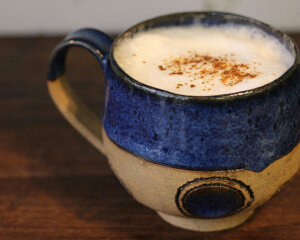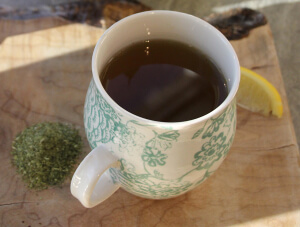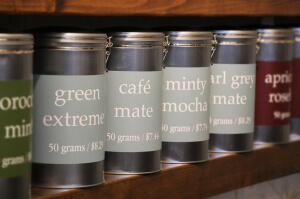Yerba Mate – the perfect coffee replacement

Finally – my perfect coffee substitute!
Since the day I quit coffee, I’ve been looking for that caffeine fix that brightens my mind, lightens my mood and gives me sustained energy for many, many hours. That’s probably not the most advisable opening to this post (being that we are the founders of a wellness centre), but if I’m being honest, I absolutely admit that I enjoy caffeine as much as the next person.
![]()
 My substitute – yerba mate. The raw green mate has an herbal flavour, but one of our blends, Café Mate, has roasted yerba mate in it, and so tastes quite a bit like coffee.
My substitute – yerba mate. The raw green mate has an herbal flavour, but one of our blends, Café Mate, has roasted yerba mate in it, and so tastes quite a bit like coffee.
Now you have to understand – I loved coffee. The smell alone created aromatic bliss for me, where I would enter into a momentary trance and all would be well. The taste was heaven; I loved its bitter and earthy flavour. And when I added a wee bit of organic cream – I savoured the richness of that perfect cup. Of course, this rant would be incomplete if I did not admit that my love affair with coffee was actually an addiction (even though I only drank one cup a day), and that the main reason I kept going back was to enjoy that energy punch, where I temporarily felt like Superwoman ready to take on anything.
But then one Sunday afternoon my coffee days came to a crashing halt in the ER, where my husband compassionately explained he thought my severe abdominal and kidney pain was in fact an allergy to coffee; I said unkind words back, but then secretly began to ponder, “were my maladies related to coffee?”. The answer was a conclusive, and irrefutable – yes.
When I stopped drinking coffee (and trust me, I tested this for many weeks), I no longer had a gut that burned like an ulcer, kidney pain, aching joints, dry skin, or a tension filled jaw. All of these symptoms disappeared after a day or two when I did not have a cup – but alas returned just as quickly when I resumed. Yet even after all that, I still wanted the pleasures I had from coffee.
That was 10 years ago – and I am still on the hunt for the perfect replacement – finally, I believe I have found it in mate. Yes, it tastes like dirty tobacco – but truthfully, from the benefits and sweet elevation I get from it, I’m sold. Per cup, mate has approximately 78mg caffeine, whereas coffee is estimated to be around 85 mg per cup. To boot, yerba mate contains caffeine cousins, (called theobromine and theophyllin), which enhance the effects, but also moderate them so as to avoid the spike followed by a crash.

Then the real beauty of mate was revealed to me. One of our staffmates, Nina, told me how she was introduced to the plant at an “improv mate ceremony” with her PhD student colleagues, a number of which were from South America (where mate originates from).
They were up grading undergraduate papers, pulling an all-nighter, and literally falling asleep around 1 am. One of her Argentinian peers said she had the perfect fix, left the room for a bit and came back with a gourd filled with mate tea, and a metal straw (called a bombilla) for them all to share. Nina said they sat in a circle and created a mini ceremony, where her associate went on to explain the cultural usage of this plant and was told that, “… it was all about the colour–it was to remind you of your connection to Earth. She told us that as we drank we were to say thank you for the spiritual help we were getting through drinking it… One of the Brazilians added that we were also saying thanks for being part of the human community, understanding we all had our challenges but that if we pause in togetherness over what bonds us, God speaks through the giving of strength, stamina, and remembrance of unity.” During the ceremony, they felt connected, and began to feel the physical effects of the brew.
This held them until 7:30 am. Nina said it woke up their minds, and gave them great stamina without jitters or crashing. Those were the magic words I was looking for – and I was in.
So I had my first cup but I could not get past the flavour of dirt, or as Nina puts it – an unlit cigar. This, apparently, has been deemed the “acquired taste of mate”. After a few attempts, I’ve now found my favourite ways to drink it, and fully enjoy the experience. The energy I got was different from coffee, and truth be told, preferable. It felt like the high you get from being in the grandeur of nature, rather than the energy rush of Times Square. I realized this is partly what my husband talks about when he refers to “green caffeine” … a number of plant-derived coffee substitutes that are not roasted, and not highly metabolically acidic like coffee, that provide a much more “bouyant” effect, rather than supercharges and crashes.
Here are a few suggestions to make it taste lovely, and enjoy the wholistic offering of this plant:

- As Nina mentioned, squeeze a wedge of fresh lemon into your tea. This lifts the flavour and freshens the smoky bitterness.
- Drink it with other flavourful herbs. Our Apothecary carries a selection of organic, fair trade mate blends that are beautiful…
- Make a Café Mate Latte – presently, this one is my favourite! Click here for our delicious Cafe Mate Latte Recipe!
The recipe above can of course be adapted by adding cinnamon, vanilla, or even cacao for a mocha Mate Latte. Or for those of you enjoying “bulletproof coffee”, add 1 Tb. of butter, ghee or coconut oil and blend on high for a mate alternative.
Is Yerba Mate healthy you ask?
Mate is nutritive to the body, rather than depleting. Following is a summary of the health benefits:
- Boasts a higher anti-oxidant value than beloved green tea.
- Has anti-inflammatory and hypocholesterolemic properties due to the saponin content. These compounds are bitter and are believed to contribute to the distinct flavour of mate.
- High in vitamins & minerals
- A central nervous system stimulant
- Increases energy levels
- Has a diverse array of compounds, not easily found in other teas (such as multiple polyphenols and xanthines including caffeic acid, caffeine, quercetin, rutin, theobromine etc. )
- Very potent inhibitor of oxidative stress caused by ROS (reactive oxygen species)
For me, as long as I am committed to balance in my life, and I take care of my needs for rest (like going to bed super early, getting a full night’s sleep), and eating well, I confidently enjoy the energy lift and health benefits from this plant.
If you’re curious about our mate blends, come in, or give us a call at 780.432.7955! For the month of February, we are having a sale on some teas as we are retiring a few to bring in new ones! You’ll find mate in the mix.

Kolya’s Apothecary Mate Blends
But didn’t I read that mate is carcinogenic?” As with most things, there is a variety of information surrounding the studies of this plant. Recently there has been some controversial information populating the internet stating that mate has carcinogenic properties. I was of course intrigued and found an article by C.I. Heck and E.G. De Mejia’s where it stated: “Contrary to the reported carcinogenic properties of Mate, there are scientifically backed reports of anticancer effects… higher than green tea”. It is not unusual to find contradictory findings, so I read on.. In a nutshell, this is what I found:
- Studies seem to be showing that it is not the raw mate causing issue, but rather contaminants found in poorly processed mate.
- Research has shown there is some concern about mate increasing the risk of some cancers (esophageal, oral, lung, bladder, renal etc.) BUT (and this is a big one) it is also comparably shown and recognized that the incidences are in regions where behavioural activities such as smoking and alcohol consumption to be a strongly associated with the culture of the regions in South America.
- It also found drinking a litre a day (which is a lot) can increase risk, and that drinking very hot tea can cause issues too. BUT AGAIN, this is true for other hot beverages, so it is suspected the increase of cancer to be due to thermal injury, and not the plant alone.
If that is not enough, there is this direct quote:
An excerpt, from Comprehensive Reviews in Food Science and Safety, Volume 9, 2010 Page 313 states: “there is no conclusive evidence that this association (cancer) is a result of the consumption of yerba mate, but rather due to various lifestyle choices including smoking and excessive alcohol consumption. In addition, these cases have primarily been reported in certain areas of South America where large amounts of yerba mate are consumed at very hot and damaging temperatures which could lead to increased absorption of carcinogens found in cigarette smoke or other environmental pollutants (Heck and de Mejia 2007).”
1. The participants were also heavy smokers & consumed a lot of fats & red meat
2. They tend to drink their mate very hot (any hot drinks may be a risk)
3. The mate consumed in Paraguay and other areas is generally smoked over a wood fire which “may” introduce carcinogens
Many experts believe that the potential risk is due to human and environmental PAH’s (polycyclic aromatic hydrocarbons), which are found virtually everywhere, including foods and beverages such as barbecued meats, shellfish, water, coffee and tea.
Our mate at Kolya Naturals is not smoked, so therefore, has no PAH’s.
References:
Health benefits and carcinogenic info in blog: January 11, 2016. http://onlinelibrary.wiley.com/doi/10.1111/j.1750-3841.2007.00535.x/full
Italicized info: one of our suppliers info; inquire for more information

